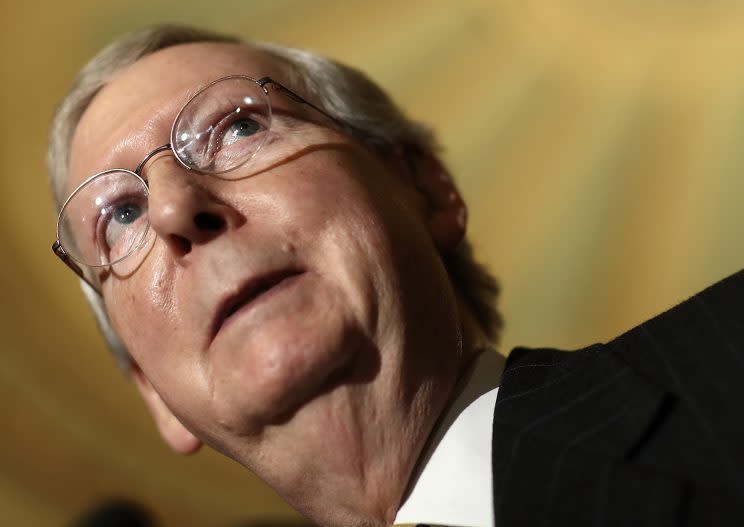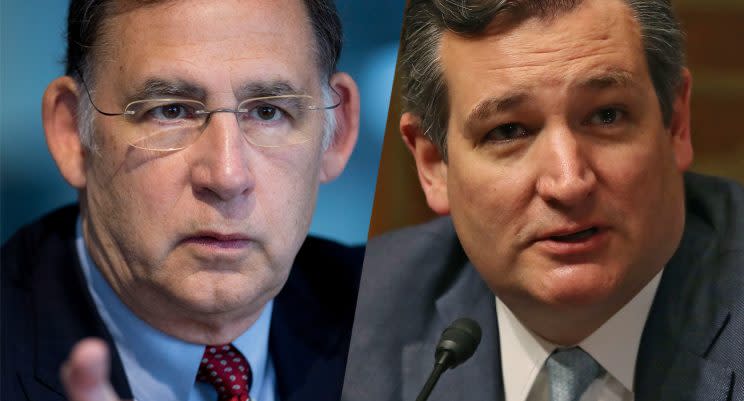Health Care Declassified: Behind the Senate’s secrecy

The words on everyone’s lips in Washington in recent weeks have been health care, as congressional Republicans work to craft a bill to replace the Affordable Care Act. But there’s a catch — very few people in Washington actually know what is going to be in this critical piece of legislation.
Enter Yahoo News’ Health Care Declassified, where we will attempt to take you inside this often complicated debate, dispelling myths and giving you the facts about how Congress will affect your health care coverage.
Following in the footsteps of their House colleagues, who passed the Affordable Health Care Act, Republicans in the Senate are carefully guarding the drafting process and expect to offer Americans affected by the law little opportunity to learn what the new bill will mean for their coverage.
The AHCA, which President Trump called “mean” after initially praising its passage, would result in 23 million Americans being uninsured, according to a Congressional Budget Office report. The Senate opted to move away from that bill, at least initially, and craft its own version. But only a handful of senators have been involved in the process and many members, including some Republicans, are unaware of what the final bill will look like and what effect it may have on American’ health care.
Sen. Claire McCaskill, D-Mo., summed up the frustration that many lawmakers, interest groups and everyday Americans are feeling at the process in a viral rant last week.
“We have no idea what’s being proposed,” McCaskill said during a meeting of the Senate Finance Committee. “There’s a group of guys in a back room somewhere that are making these decisions. There were no hearings in the House. I mean, listen, this is hard to take.”
McCaskill directed some of her anger toward Finance Committee Chair Orrin Hatch, R-Utah, who has been deeply involved in the health care debate. Despite saying Thursday that he hasn’t seen the text of the bill, Hatch has maintained that the first priority should be securing enough votes on the matter and not giving the public enough time to scrutinize the bill.

“Well, I think we’re not worried so much about that as we are getting it together so we can get a majority to vote for it,” Hatch said, according to Talking Points Memo.
It is unclear, however, when the Senate will even reach that point. Senate Majority Leader Mitch McConnell, R-Ky., has long been committed to passing a version of the health care bill by Congress’ customary July 4 recess.
But Politico is reporting that this deadline may be undoable, with less than two weeks left before the holiday break. That deadline is a shift from McConnell’s initial goal of passing a bill by the end of June.
“You know, I thought that was a stretch anyway,” Sen. Shelley Moore Capito, R-W.Va, told Politico of that late June goal.
Moore Capito is part of the working group that is attempting to hammer out a deal on the matter that will cover such hot-button issues as Medicaid expansion and coverage for people with pre-existing conditions while trying to bring down premium prices.
Yet she is one of the Republican members who have said that they don’t know what the final bill will entail. Other key stakeholders, including Department of Health and Human Services Secretary Tom Price, have admitted they too haven’t seen text from the proposed legislation.
Senate leaders are hopeful that passage of the bill, which they say will happen sooner rather than later, will spur on the House to take up their version of the law and send it to Trump. But it is unclear whether that will happen.
_____
Process draws criticism from nonprofits and governors nationwide

Senate Democrats aren’t the only ones fed up with the shroud of secrecy surrounding the new draft of the Republican’s health care bill. A bipartisan group of seven governors and numerous patient advocacy groups including the American Heart Association and the March of Dimes have asked Senate Majority Leader Mitch McConnell to open discussion of the legislation, so far to no avail.
According to the LA Times, the patient advocacy groups asked to meet with McConnell’s office about the bill anytime between Friday and June 22, only to be told that the senator was “too busy” to hear their concerns.
“The Senate staff generally don’t know anything,” Dick Woodruff, vice president of the American Cancer Society’s advocacy arm, told the LA Times. “There are so few people who understand what is going on that having meetings isn’t particularly productive. … This is such a closed process.”
However, the group of governors, which includes Gov. Kasich of Ohio and Gov. Bullock of Montana, took a more public approach with their complaints about the process of drafting the bill, sending an open letter to both McConnell and Senate Minority Leader Chuck Schumer pleading for the process to be bipartisan and requesting that the Medicaid provisions in the House version of the bill be altered.
“We believe that, first and foremost, Congress should focus on improving our nation’s private health insurance system,” the letter states. “Improvements should be based on a set of guiding principles, included below, which include controlling costs and stabilizing the market, that will positively impact the coverage and care of millions of Americans, including many who are dealing with mental illness, chronic health problems, and drug addiction.”
The governors’ letter also emphasized disappointment in the health care bill passed by the House last month.
“Unfortunately, H.R. 1628, as passed by the House, does not meet these challenges,” the letter states. “It calls into question coverage for the vulnerable and fails to provide the necessary resources to ensure that no one is left out, while shifting significant costs to the states.” — Taylor Rogers
_____
GOP senators struggle to explain how the health care bill will work

Senate Republicans floundered this week as they answered questions from Vox about their secret health care bill.
Since the text of the bill is still not publicly available, Vox asked eight Republican senators to explain their goals and the inner workings of the new health care policy. The senators could point to specific desired outcomes but stumbled when it came time to explain how the policy would work.
The Republicans did all offer up a list of several different problems brought about by Obamacare that they hoped the bill would solve.
Sen. John Boozman and Sen. Ted Cruz both expressed hope that the new bill will bring down premiums, while Sen. Rob Portman said he’s “not suggesting premiums will go down, but they won’t go up as much.”
Meanwhile, Sen. Roger Wicker said the replacement plan will “encourage more freedom,” and Sen. Chuck Grassley said that it will bring certainty to the insurance market.
For Sen. Shelby Moore Capito, it’s “the goal” to “protect the people with preexisting conditions [and] protect people with Medicaid.” Sen. Lisa Murkowski said that she hopes for “greater access and lower costs,” and Sen. John McCain told Vox that one of the “big problems” that the bill is trying to solve is “trying to get to 51 votes.”
Both Portman and Grassley cited the loss of insurers in state health care markets. Grassley noted that the bill would allow insurers to “know what the government policy is,” giving the companies the certainty they needed.
But the senators struggled to explain how their bill would tackle those problems.
For instance, when Vox asked Boozman how the bill would bring down premiums, he replied, “It’s working together and coming up with a bill that does that.” Vox later asked Boozman again to explain how the bill would reduce costs, to which he said, “Again, that’s what we’re trying to work through. Identifying the solutions that will work.”
And when Vox asked Wicker to describe how the bill would “rescue a system teetering on the brink,” he explained why the current system was failing but did not explain how the bill would save it. When Vox pressed him for details, he said, “For the reasons I’m giving you,” calling it “a very comprehensive answer.”
Murkowski expressed obvious frustration with the Republicans’ lack of progress on the bill’s text, noting, “I can’t show to my constituents back home anything concrete because we don’t have anything. We’ve been talking about ideas.”
“What’s the Senate bill going to look like?” Murkowski said. “I don’t know.” — Julia Munslow

_____
Read more from Yahoo News:

